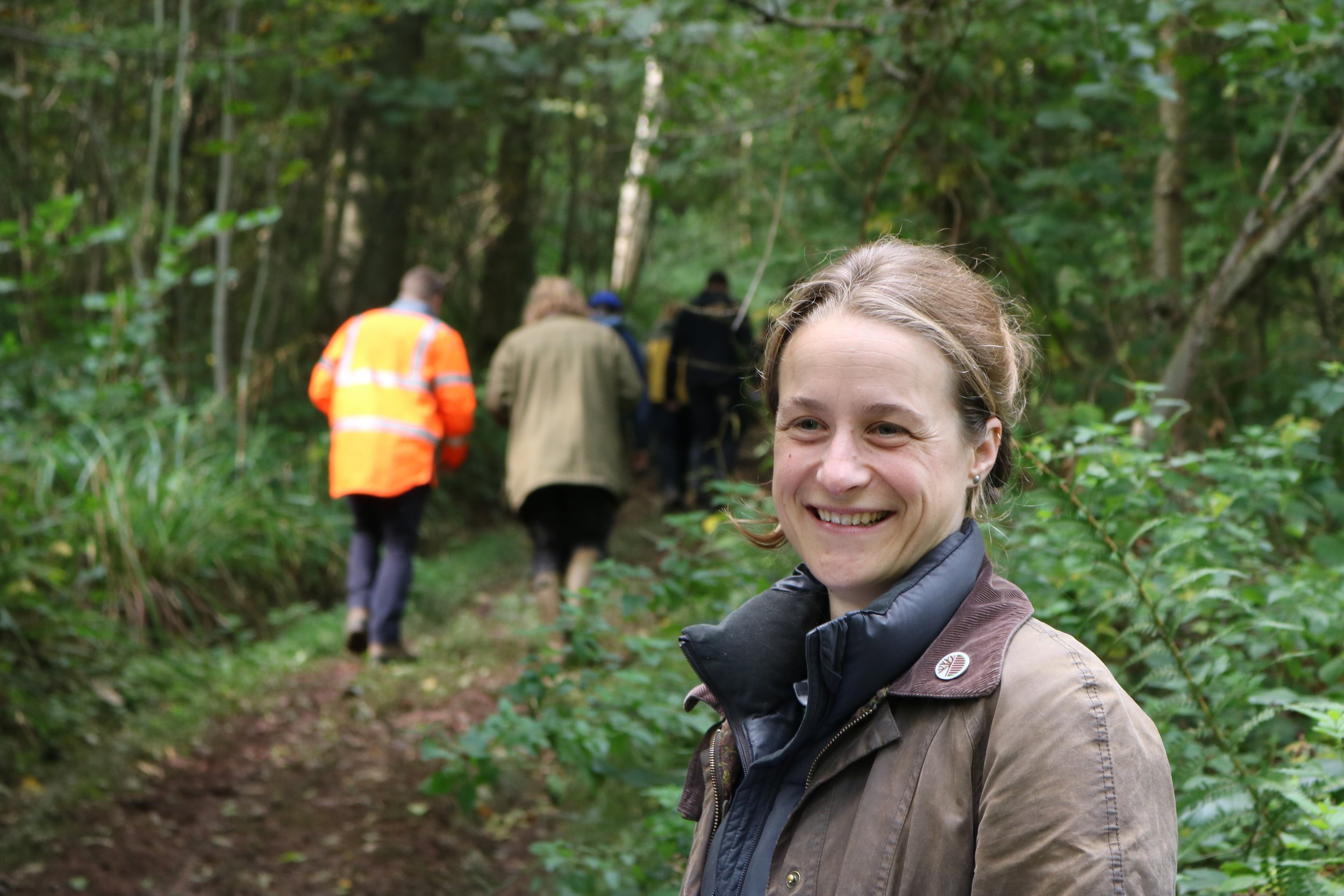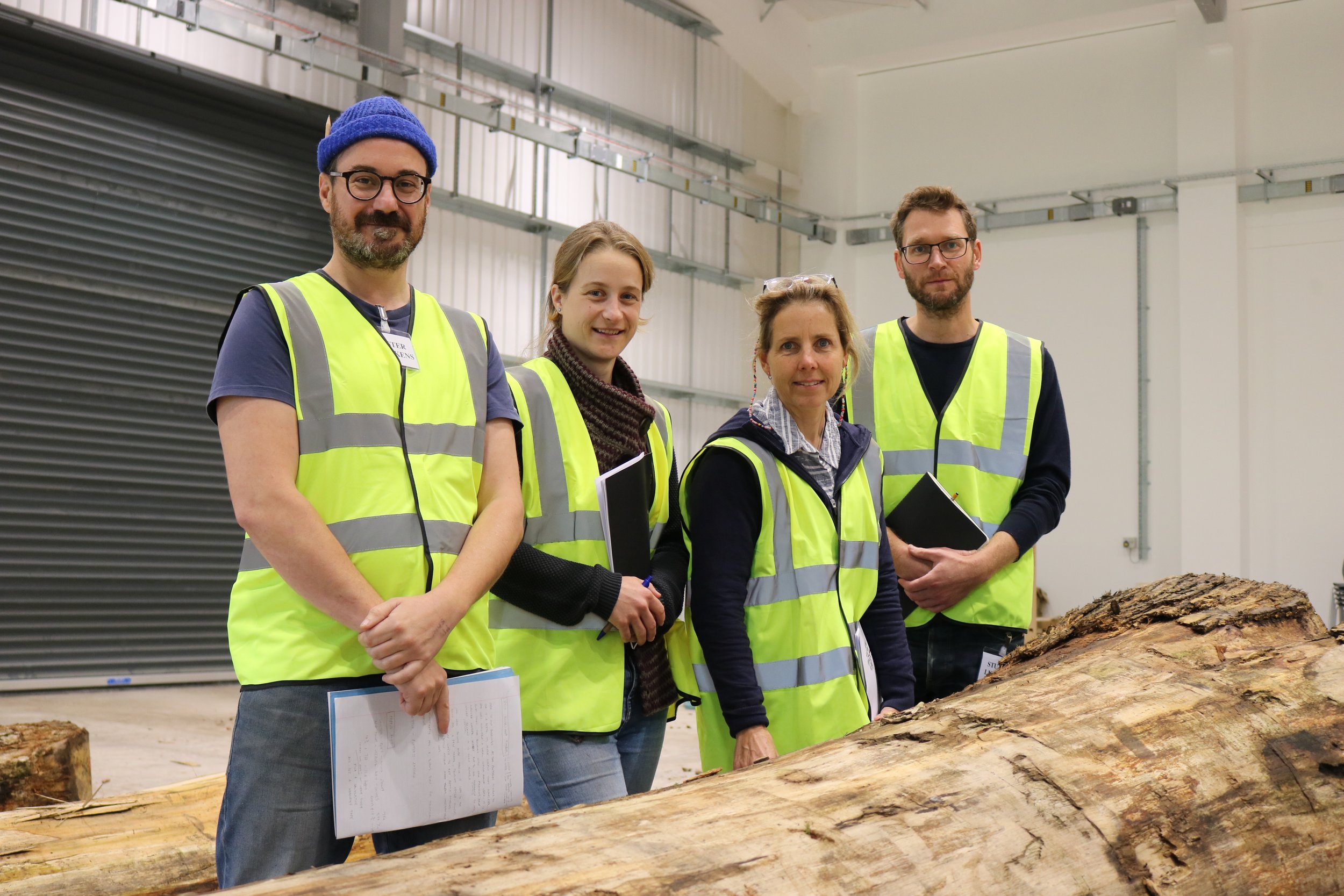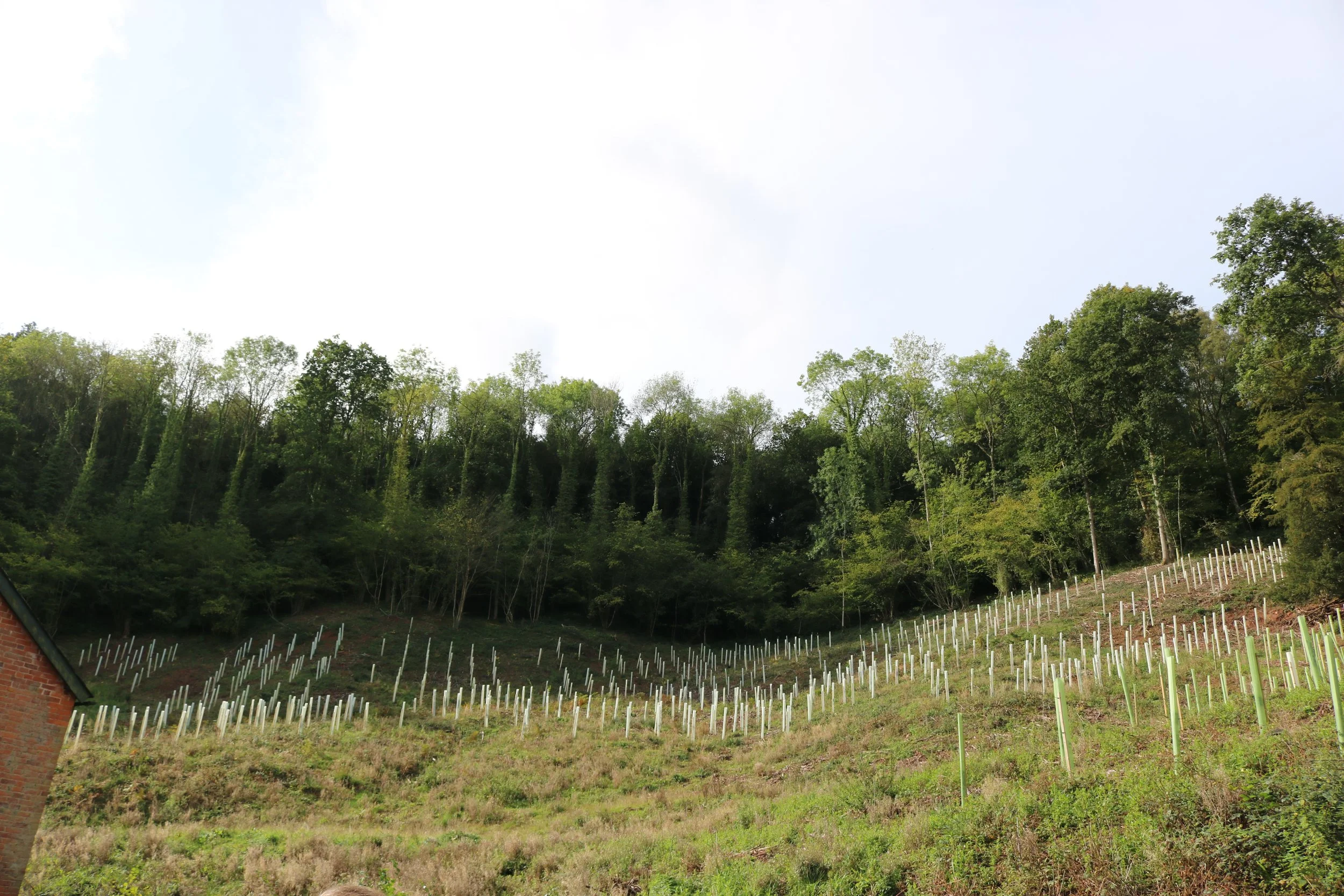Linking Tree Growers with Wood Users
The Woodland to Workshop course broadens horizons and raises awareness by educating participants from the forest through to the workshop and beyond. This ground-breaking course is supported by knowledgeable practitioners and eminent speakers from the timber industry. Based in the woodland, timber yard, sawmill and joinery workshop, this is an intense, practical course that will give attendees knowledge to last a lifetime.
These innovative courses often have a waiting list to attend as numbers are restricted to enable a ‘hands on’ and highly interactive approach, ensuring a learning opportunity of enduring quality that has been enjoyed by hundreds of passionate people over the years.
Course information
Location: NMITE facility Hereford; Whitney Sawmills; Duchy of Cornwall Woodlands, Herefordshire
Course dates: Next course: 23 to 25 September 2025
Now open for booking! Please scroll down to find the booking link and information.
2026 dates, to be confirmed.
Register your interest in future courses below.
Cost: £600 per person.
You can find more information about the grants available on our Grants page.
Please note the course fee does not include: accommodation, food or transport.
CPD: In agreement with the Institute of Chartered Foresters members of the Institute can claim up to a maximum of 24 hours CPD for attendance and participation in this event.
With thanks to
Booking for the Woodland to Workshop Course 2025
is now open.
Please read our Terms and Conditions before booking your place.
Booking your place will include paying the fees for the course. Your place will be reserved when the fee has been received by Woodland Heritage.
Please book your place using the button below.
If there are no places left when you come to book, please contact office@woodlandheritage.org to be added to the cancellation list for the 2025 course. We will be in touch if a place becomes available.
For information about grants, please take a look at our Grants page.
If you have any questions, please contact us.
Register your interest
Please use the button below to register your interest in future dates for
Woodland To Workshop Courses.
The course has high attendance each year. Those already on the waiting list will be
contacted ahead of the dates being published.
You can download a copy of our course Terms & Conditions using the link below:
Course Tutors
Woodland To Workshop Tutors are industry experts ready to share their knowledge with you. Tutors for each course will be subject to their availability.
Ben Anderson
The Duchy of Cornwall
Ben is the Deputy Head Forester for The Duchy of Cornwall whose woodland estate covers approximately 6000 acres across the British Isles.
Ben graduated from Harper-Adams in 2001, having studied Agriculture; following several years working on mixed Estates, he later studied Forestry at Newton Rigg, graduating in 2013. Since then Ben has worked for the Forestry Commission and a consultancy company prior to joining the Duchy of Cornwall. Ben became a Chartered forester in 2017 and recently completed his MSc in Rural Land Management.
Dermot Doyne
Whitney Sawmills Manager
Dermot is a trained cabinet maker , having attended Rycotewood college. He worked for a bespoke cabinet maker in London for nine years before moving to mid-Wales as a production manager in a mass produced pine furniture factory.
In 2000 Dermot set up a company of bespoke furniture making producing high end products for domestic and corporate refurbs as well as a lot of shopfitting . In 2018 he had a change of career when he took over the management of Whitney Sawmills.
Jez Ralph
Evolving Forests
Jez Ralph is the Director of Evolving Forests. His background is in forestry and has spent the last twenty years combining this with built-environment expertise. In 2012 Jez spent a summer at the Helsinki Wood Studio followed by a Nuffield Farming Scholarship researching global examples of localised supply chains for high-value timber. Jez specialises in timber product development, timber properties and architectural applications for diverse wood types as well as landscape-level development of innovative forest systems for future resilience.
Geraint Richards
Head Forester to the Duchy of Cornwall and to His Majesty The King
Graduating in 1992 with a degree in forestry from Bangor University he worked for four years for the Forestry Commission before taking up his current role. Geraint is involved with a wide range of tree, woodland and forestry organisations and initiatives in the UK and internationally. He is a Fellow of the Institute of Chartered Foresters and its current President and is also the Chair of Action Oak. Geraint was made a Member of the Royal Victorian Order (MVO) in 2017 and in 2019 was awarded the Royal Forestry Society’s Gold Medal for distinguished services to forestry.
Geraint is a former Woodland Heritage Trustee and one of the Woodland To Workshop Course founders.
Graham Taylor
Pryor & Rickett Silviculture
Following a forestry degree at Bangor, Graham moved to Herefordshire in 1990. In 1993 he joined Pryor and Rickett Silviculture as a forester, becoming a Director in 1998 on incorporation. He is personally responsible for over 10,000 acres of forested land in England and has overseen the growth of the company in recent years. For many years, Graham has been responsible for specialist timber harvesting in the highly sensitive nature reserves of the Worcestershire Wildlife Trust and on people’s doorsteps in the community woodlands of Redditch. He has also been instrumental in developing the commercial forestry side of the business, managing investments in the uplands of Wales and further afield, whilst keeping a close eye on the forestry freehold markets.
Graham was awarded an MBE for services to forestry in 2017.
“The presentation by Jez Ralph and Dermot Doyne was fantastic, great to see the different ends of the industry come together.”
Locations
Whitney Sawmills
Based in Herefordshire, Whitney Sawmills is well established as a leading British sawmill. For many years they have supplied fresh sawn Oak and Douglas Fir beams as well as air- and kiln-dried timber including Oak, Ash, Sweet Chestnut, Sycamore, Cherry, Elm, and Poplar.
We are also renowned for providing unusual and specialist hardwoods and softwoods in demand for particular restoration projects as well as furniture making and house-building.
NMITE Hereford
NMITE (New Model Institute of Technology and Engineering) welcomes you to a campus built with sustainability at its heart.
The perfect setting for practical learning, make the most of opportunities for testing, prototyping and manufacture. Simulating a real-world industrial environment, learning here is all about ‘doing’ - part of the unique NMITE approach.
Duchy of Cornwall Woodlands
During visits to the Duchy woodlands topics covered, demonstrated and discussed may include: Tree species selection, Planting designs in relation to tree competition and the landscape, Vegetation control, Pruning and cleaning, Thinning, Protection from grey squirrels and deer, The recognition of potentially valuable stems of oak.
“The enthusiasm and experience of the tutors for the aims of the course and the wider timber use trade was a big factor in my enjoyment and learning.
”
Course aims, values and outcomes
Course aims
To bring the theory of productive woodland to life, to connect attendees with all aspects of the timber industry: from planting and managing, through felling and milling, to using, making and cherishing.
Course values
A unique course linking tree growers and wood users
Creating networks between students, and vitally between students and tutors
A short, intense, practical course; taught by tutors who do what they teach for a living (skills succession & lived experience)
We think about trees and wood holistically
We communicate the economic and environmental value of trees
We are reviving a wood culture in the UK
Course Outcomes
For attendees to feel informed about future decision making. Allowing them to take active decisions in relation to:
Sourcing UK wood
Managing trees and woodlands
Growers creating links with processors
Processors creating links with makers
Makers creating links with growers and processors
NMITE Partnership
In 2023, Woodland Heritage began a successful partnership with NMITE, Hereford’s New Model Institute for Engineering and Technology. We are pleased to say that this partnership will continue for future Woodland to Workshop courses.
This partnership fulfil’s Woodland Heritage’s value of empowering collaboration. The attendees of Woodland to Workshop courses will benefit from use of the fantastic facilities of NMITE and the guidance of their tutors.
NMITE, which already has a strong reputation in the timber industry through its Timber Technology Engineering Design (TED) courses, was delighted to partner with Woodland Heritage in 2023 and is looking to replicate its teaching success again in 2024. Describing this as a perfect partnership “where Woodland Heritage’s remit finishes, NMITE’s teaching takes over”, NMITE Assistant Professor Steve Bertasso says:
“Timber and woodlands need to sit at the centre of sustainable solutions now and in the future. The built environment is the world’s largest producer and consumer of greenhouse gas emissions. Creating solutions through and from natural, renewable sources, like timber, produces fewer emissions than other building materials. The new partnership between Woodland Heritage and NMITE brings together the two ends of a circular building industry.”
Lizzie’s Learning Legacy
We are very grateful to Rupert and Cecilia Orchard and their family for the funding they have raised for bursaries for the course, in memory of their daughter and sister Lizzie who loved trees and loved learning.
What’s included
Your course pack and tutors will help you learn more about:
Tree species selection
Planting designs in relation to tree competition and the landscape
Vegetation control, pruning and cleaning, thinning
Protection from grey squirrels and deer
The recognition of potentially valuable stems of oak
Distinguishing between normal drying splits and shakes
Minimising damage caused by beetles
Practice identifying various kinds of damage and undesirable features of logs, including woodpecker damage, spiral grain and blue stain fungi and wide sapwood.
Likely markets for unusual logs, including curved stems, “pippy” oak, and ripple-grained sycamore
The merits of a portable band saw.
Practice measuring and calculating timber volumes both in the forest and the sawmill. The importance of accuracy and reliability. The losses incurred when converting a log to planks were also discussed.
Air drying
Filmed in 2015, the video below can help you get a feel for the course, its beginning, and its relevance today.



















